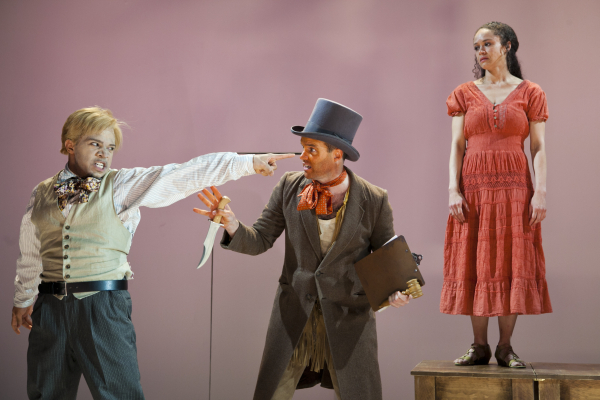An Octoroon
Something old, something new, something borrowed, and something black: Branden Jacobs-Jenkins puts a new twist on an old American play.

(© Pavel Antonov)
Blackface: Does it have a place on the modern American stage? Your answer to that question may very well determine your decision to buy a ticket to the world premiere of Branden Jacobs-Jenkins'An Octoroon at Soho Rep. But even if your response is an emphatic "No", you should still check out this superb play that employs black, white, and redface in unexpected ways while reclaiming a lost gem of the American stage.
This is not the first time Jacobs-Jenkins has grappled with race: His 2010 show Neighbors featured a cast of white actors playing an offensively stereotypical black family. His most recent play, Appropriate, is about a white family that discovers an album of lynching photos while cleaning out a deceased patriarch's home.
While An Octoroon revisits many of these themes, it does so in a more formally challenging way. It's a strenuous and daring display of theatricality that goes far beyond issues of race in America. In fact, Jacobs-Jenkins hits on so many ideas per minute, you'll wish you had a little more time to catch your breath.
Much of the story is drawn from Dion Boucicault's The Octoroon, which was an instant hit when it opened at the old Winter Garden Theatre in 1859. Jacobs-Jenkins pulls the camera back to capture the angst-ridden playwriting process itself: A monotone young black playwright, BJJ (Chris Myers), stands before the audience in his undies and recalls a therapy session. Moments later, he reveals, "Just kidding. I don't have a therapist. I can't afford one." This is the first of many such moments that straddle the line of sincerity and satire. Can we ever fully trust anything said by these people who dress up in costumes and pretend to be other people? (No.) That sense of uncertainty is part of the fun.
"You're melodramatic," BJJ screams into a mirror. He's quickly echoed in a snide tone by a white onlooker, who just so happens to be Dion Boucicault (Danny Wolohan). The two scream expletives at each other Marina- and Ulay-style before BJJ gives up and they begin the play in earnest. Suddenly, the back wall of the stage falls forward, blasting us with a gush of air and revealing a snow-white stage, covered in cotton (design by Mimi Lien).
This is Terrebonne, a Louisiana plantation that George Peyton (Myers in whiteface) inherited after the death of his uncle, the Judge. The plantation is in dire financial straits, but could be saved if George were to marry Dora (Zoë Winters), a wealthy young heiress from a neighboring estate. To Dora's consternation, however, George is in love with Zoe (Amber Grey), the octoroon (⅛ black) daughter of the Judge and one of his slaves. Before he died, the Judge granted Zoe's freedom. The evil overseer M'Closky (Myers) desires Zoe for himself and plots to re-enslave her to Terrebonne and buy her at a forthcoming creditors' auction. Buhahahaha! *thunder clap*
Myers gives a tour de force in his triple roles as the blasé black playwright, the charming leading man, and the mustachioed villain. It all culminates in a thrillingly ridiculous duel with himself (ingeniously choreographed by J. David Brimmer). Similarly, Ben Horner (in blackface) gives committed performances in the dual roles of Uncle Tom-esque Pete and adorable slave boy Paul. The latter is so sickeningly sweet and endearingly dumb, especially with his Indian sidekick Wahnotee (Wolohan in redface), he could have his own family television series circa 1955 (think antebellum Lassie).
As the house slaves Minnie and Dido, the hilarious Jocelyn Bioh and Marsha Stephanie Blake provide much-needed comic relief from this sentimental and contrived plot. They give an almost Brechtian commentary on the main plot while letting us in on their own lives as slaves: While sweeping up the cotton, Minnie asks, "You really think Mrs. Peyton's upstairs dying from heartbreak?" Dido replies, "No. That b*tch is dying cuz she old as hell." Ostensibly 19th-century slaves, their diction is so modern in its wit and inflection, they could easily be transplanted to any stoop in Bedford-Stuyvesant without causing much of a stir. In his own defense, Jacobs-Jenkins writes in the stage direction, "I don't know what a real slave sounded like. And neither do you."
Director Sarah Benson pushes a breakneck pace to squeeze Boucicault's four acts, as well as Jacobs-Jenkins' metatheatrical frame, into 2 hours, 15 minutes. Cellist Lester St. Louis helps create the dun dun dun with his live accompaniment, which underscores much of the show. César Alvarez of The Lisps has composed additional music, some of which sounds straight out of Ken Burns' The Civil War, to create the world of the Old South. In the very end, this music finally gives us the respite for contemplation that we desperately need to process the madness we've just witnessed.
An Octoroon is fearless, dangerous theater that challenges conventional notions of history and performance. Also, it's incredibly funny. You wouldn't want to miss that by dismissing it at face value.









